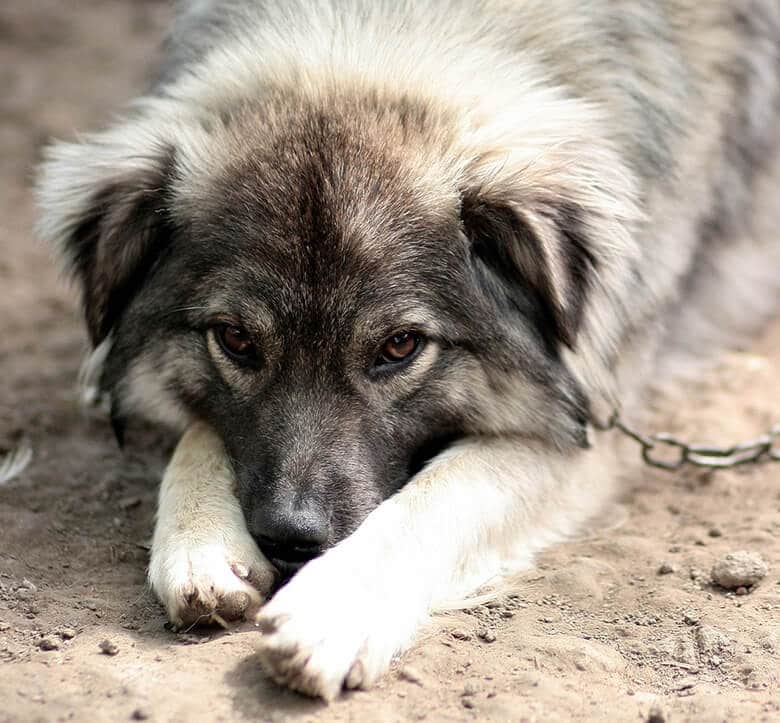Animal cruelty and neglect appears in many forms. From dogfighting to a dog that’s left alone 24/7 on a chain in the snow. We know it when we see it. But what can we do about it?
First, you need to understand the legal definition of animal cruelty. The Humane Society of the United States separate animal cruelty into two categories: neglect and direct abuse.
Neglect and Direct Criminal Abuse
Criminal animal neglect involves the failure to provide an animal with basic necessities such as food, water, shelter and veterinarian care “sufficient for survival.” Whether it’s deliberate or unintentional, the animal suffers greatly, and the longer the situation goes on, the greater the possibility of illness, pain and even death.
Related: After Reported Abuse of Greyhounds, The Pet Blood Bank Closes
This kind of neglect inflicts long-term suffering that sometimes may be worse than direct physical abuse. An animal that is starving goes through prolonged symptoms and physical deterioration. An animal without shelter can freeze to death or die of heatstroke, often dying just yards away from the homes of their “owners.” In some counties and states, long-term chaining may be illegal, and even if it’s not, chained dogs are helpless and isolated, which often results in behaviors such as aggression, depression and even self-mutilation. Twenty-two have laws making chaining or tethering an animal illegal.
Direct abuse involves physical beating and violence. It’s easy to spot and very hard to watch, but if you see it, bear witness (more on this in a moment). It’s also noteworthy that a link has been established between animal cruelty and human violence. In seven school shooting that occurred between 1997 and 2001, all of the boys involved committed animal cruelty previously, according to HSUS report. (Devin Patrick Kelley, the gunman who recently killed 26 people inside a small Texas church, also abused animals.)
There are laws in place regarding both animal neglect and animal cruelty, and those responsible can be prosecuted.
How to Report Neglect and Animal Cruelty
If you witness animal abuse or neglect, the HSUS advises that you call your local animal control agency or 911. If you live in an area where there aren’t animal welfare agencies or law enforcement isn’t equipped to deal with animal cruelty cases, you can call the HSUS at:
202-452-1100 or 866-720-2676
Monday through Friday 8 a.m. to 11 p.m.
Saturday and Sunday 9 a.m. to 6 p.m. Eastern time
If you find a stray or injured animal, you can call a shelter or local animal control. However, be aware that some shelters are high-kill. You can find a list of no-kill shelters at the noKillnetwork.org.
Related: Quadruple Amputee Dog Rescued From Meat Trade Is Now a Therapy Dog
Tips for Reporting Animal Cruelty
The ASPCA has recommendations for reporting animal cruelty so that prosecution is successful. For starters, be ready to provide specific, concrete information to the police or investigators that includes:
- A statement of what you observed with dates and times
- If you can photograph the animal without trespassing, take pictures of the animals and the environment
- Provide the names and contact information of people who have first-hand information about the abuse, which includes dogfighting.
Keep a record of who you contact, with their names, dates, times and any outcome. Make sure to keep copies of any documentation you hand over.
Be sure to be clear about your initiative to be of assistance in a legal case. You can make a report anonymously, but law enforcement and organizations are more likely to pursue cases with credible witnesses who are willing to testify in court.
If you don’t receive any response from the officer assigned to the case after a reasonable period of time, call them to enquire about the case, and be polite! These agencies tend to be understaffed. If nothing happens after that, be prepared to contact their supervisor or local or state government official.
Be aware that you may witness animal cruelty on websites, television, or film. Try to track down the location, or determine where the abuse took place and contact local officials For online cases, contact the website host or sponsor. Major internet providers usually have service agreements that prohibit this type of material.
Related: The ‘Horrible Hundred’ Report Released to Shine Light on Worst Puppy Mills


















